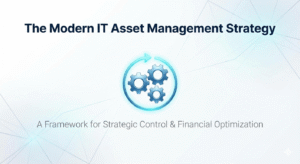When client outcomes depend on flawless timing and absolute accuracy, it only takes one lost file, outage, or technology hiccup to throw your legal services firm into chaos. Tech decisions made by IT partners that don’t understand the demands of a fast-moving legal practice only add to the mayhem.
In your world, leaving IT on autopilot, or in the hands of a one-size-fits-all vendor, can have serious consequences. Slow or inadequate support keeps you bogged down with IT issues. Your team is left dealing with risks ranging from lost billable hours to a damaged reputation that can take years to repair.
The difference between smooth operations and major disruptions often comes down to who’s steering the technology ship. Sharp oversight from a trusted managed services provider (MSP) helps you keep IT spending in check and bring threats and inefficiencies to the surface quickly for resolution. This leaves more dollars and more hours for investments that deliver real value for your clients and practice.
Assessing your IT MSP: How does it stack up?
Can you confidently say that your current IT MSP, or your in-house IT team, truly understands what it means to protect and support your legal services firm? When so much depends on confidentiality, deadlines, and compliance, meeting the bare minimum just isn’t enough. To help you determine where your IT services stand, we created a self-assessment you can use as your own reality check.
Below you’ll find vital questions that represent the full assessment criteria available in our new IT Money Pit report, meant to root out hidden vulnerabilities and inefficiencies that your own team or provider may miss. Going through these sample questions can help you:
- Determine how well your current tech setup supports your needs
- Assess the reliability and responsiveness of your IT support
- Spot weak points and opportunities for improvement
- Vet a new IT partner when the time is right
Does your IT support truly deliver? Let’s find out.
Protecting against threats
Q: Law firms are becoming prime targets for cybercriminals as they seek access to privileged client communications, case files, and sensitive records. Does your IT MSP proactively monitor, patch, and update your entire IT environment daily, including case management systems, email, and legal research tools, to maintain security and safeguard attorney-client privilege?
If your MSP does this, then your firm is drastically reducing the odds of breaches, ransomware attacks, and compliance lapses. You’ll be ready for audits, regulatory inquiries, and even client scrutiny because you know your systems and client data are secure. Your firm won’t be the one known for the breach that ended up in the news or before the disciplinary board.
If they don’t do this, then you’re taking major risks. Not only are attorney-client privileges jeopardized but document integrity and your firm’s reputation are, too. No attorney wants to admit to a client that their confidential deposition was leaked, or to defend a cyber incident in front of the bar.
Constantly communicating
Q: Legal work is fast-paced, sensitive, and ever-changing as industry developments and emerging threats shift. Does your IT partner provide routine, honest updates and executive briefings about new risks, technology changes, and the steps they follow to protect your firm? You never want to be in the dark about your risk posture or compliance.
If your MSP does this, then you can be sure about the level of transparency they provide. They’re equipping you with the information you need to make smart decisions and reassure regulators and clients that risks are addressed. You’re also gaining foresight that will help you spot potential issues before they escalate.
If they don’t do this, then blind spots are building up. You’re being left vulnerable to IT problems, compliance gaps, and unexpected outages that can leave you exposed amid important deadlines or hearings.
Removing tech stack waste
Q: As they expand their caseloads and teams, many law firms accumulate unnecessary software, duplicate platforms, and excess licenses. Does your IT MSP conduct regular audits of your tech stack to identify overlap and waste? They should be proactively looking for ways to eliminate redundant tools, unused accounts, and surplus licenses that drive up costs and add risk to daily operations.
If your MSP does this, then you know you’re not spending more than you should on your technology. You pay only for platforms that bring value to your work. The rest of your resources can go back into client services and case work instead of being lost among forgotten subscriptions and underused licenses.
If they don’t do this, then hidden tech waste is steadily eating into your profits and possibly creating compliance gaps as old accounts or software sit unmonitored. Letting unchecked systems and costs accumulate means you face the very real risk of walking into a courtroom with technology putting your reputation on trial.
Controlling and being transparent about access
Q: It’s critical that legal services leaders know who has access to sensitive case files, privileged materials, and client data. Do you know whether your IT MSP outsources your support to third parties? If so, do they show you the controls and security measures in place to protect your client information and practice?
If your MSP communicates with you about this, then you can be sure access is accounted for: only trusted hands touch confidential client materials. Your firm is also protected against insider threats and careless mistakes that could result in breaches or bar complaints.
If they don’t, then your law firm is leaving the door wide open. You may not even know when third parties are handling or interacting with your data and systems, opening up the opportunity for mistakes, compromise, or data leaks. Blind trust can leave sensitive cases in the hands of strangers, where one wrong move could turn a confidential matter into an incident that clients may never forgive (or forget).
Is it time to rethink your IT approach?
If one of the questions above give you pause, then your technology partnership probably isn’t the right fit for the demands and risk profile of your legal practice.
Forward-thinking law firms put their trust in IT experts who specialize in turning technology from a source of friction to a tool for excellence. When you choose an IT MSP that understands how to support legal teams, you can take on more cases while being confident that your technology will help you manage it all.
Ready to find out where your IT stands … and where it could take you next? Get your copy of our full checklist to uncover areas for improvement. With answers in hand, you can start building a technology strategy that protects client interests and advances your practice.





